Kitchen Garden community survey: what we learnt
We’re always keen to find out what the Kitchen Garden community thinks, so we created a survey to capture the voices and experiences of past and current students, their parents and carers, educators, volunteers, and anyone involved in our pleasurable food education movement.
The goal was to discover their successes, trials, suggestions, and observations. They ended up covering many aspects of the program – from the positive impact it has had on young people, to the challenges some educators have with maintaining the program.
We’ve had nearly 800 responses from all areas of the Kitchen Garden community to date, and the survey is still live. Anyone who hasn’t yet completed it is warmly welcome to contribute.

What we learnt
Many respondents noted that the program teaches students what it takes to grow vegetables, and how turning fresh produce into delicious food has helped them realise the joy in making and eating nutritious meals. Program learnings are being taken beyond the school or service gate and implemented in children and young people’s home lives. One Kitchen Garden Coordinator observed, “healthy eating habits at school are taken home and discussed.”
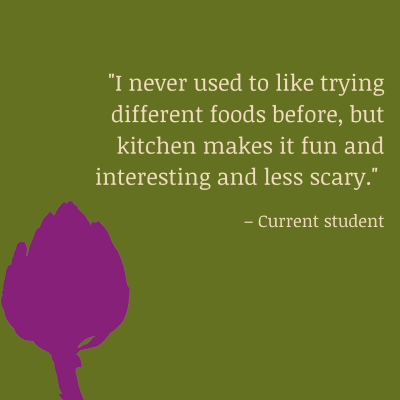
Many parents of current students noted in their responses that their children’s involvement in the Kitchen Garden Program has meant that they are open to at least trying everything given to them at mealtimes at home. And for students not normally enthusiastic about school, 76.5% of parents/carers said that their child’s enthusiasm is increased on program days.
Community engagement
While children and young people are the most obvious participants, it was heartening – and fitting – to see so many respondents point out how much the wider community is involved. From parents using the garden as a transition tool for drop offs, to local residents admiring the garden from the outside. 62% of parent/carer respondents agreed that their involvement with the Kitchen Garden Program had resulted in stronger community connections.
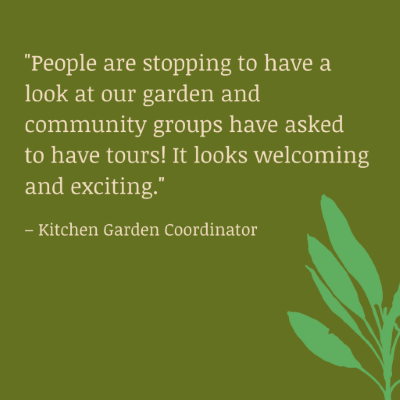
The survey responses also revealed that the Kitchen Garden Program fosters a recognition of the importance of community connection on the students’ part. Through working together with volunteers as well as members of the wider school community, participants develop teamwork alongside communication and interpersonal skills.
It is a great outreach to the community, and fosters cooperation in planting, tending, harvesting and eating, as well as excess food being shared with the community.” –Educational Support
“Gives the kids an outlet to express themselves and teaches life skills and covers all the personal development traits we as educators endorse and teach to all the kids such as teamwork, self-esteem and confidence, and much more. It’s such a flexible and fun program that caters for so many different settings.” – Kitchen/Garden Specialist
Learning and involvement
What was clear in all the survey responses was just how much the Program impacts the day-to-day lives of students involved. Those who found classroom learning difficult could find a creative outlet in using their hands in practical activities and play-based learning, and teachers saw attendance rise for those who had previously found school unengaging.
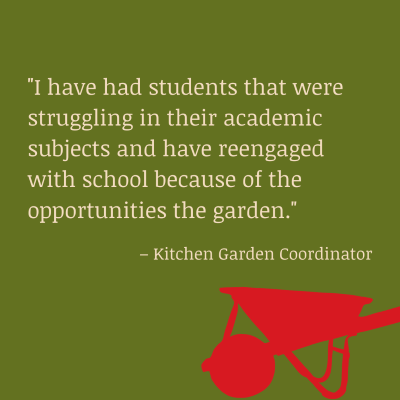
“The Program has also shown me how important this kind of program is for many of the children who are challenged by the conventional classroom environment.” –Kay Tomlinson, Kitchen/Garden Specialist
Life skills are developed through learning to cook and garden, and a number of responses saw the Program’s influence in students picking career paths where they could continue to make use of the skills first learnt in the Kitchen Garden Program.
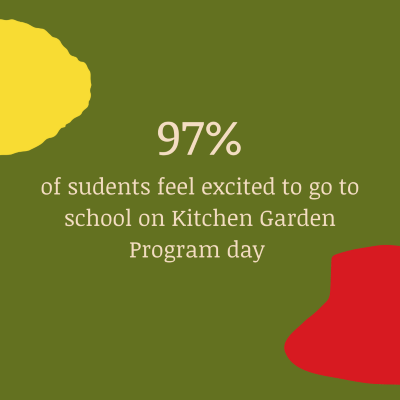
Overcoming challenges
We also wanted to find out how Program members had been challenged in setting up and/or maintaining their own kitchen garden programs. A point that often came up was how important it is for the school community, and particularly those in leadership positions, to see the value in running the Program. Several educators said they had experiences where parents couldn’t see how the Program integrated into the curriculum. However, we also received several responses from parents noting that the Program made their children more interested and invested in the natural environment, while learning to cook taught fractions and measurements in a practical way. One parent said their child’s “maths skills, fine and gross motor skills, communication skills and self-confidence have all grown with help from the Program.”
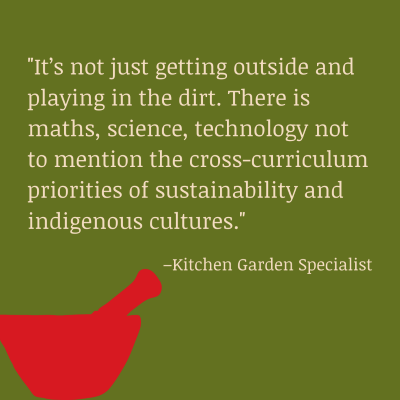
Some educators, principals, and centre directors also pointed out that the Kitchen Garden Program boosted enrolment numbers and made their school a more attractive option for prospective parents. Kitchen Garden Specialist Craig Goldfinch pointed out that for his school, the Program is “starting to be talked about in the community, which is bringing in new families to the school.

"The school draws enrolments and family due to the reputation of the SAKG program." – Lucia, Kitchen/Garden Specialist
The responses from parents of current students confirmed this, with 40% of respondents saying that the presence of the Kitchen Garden Program was a factor in choosing their child’s school.
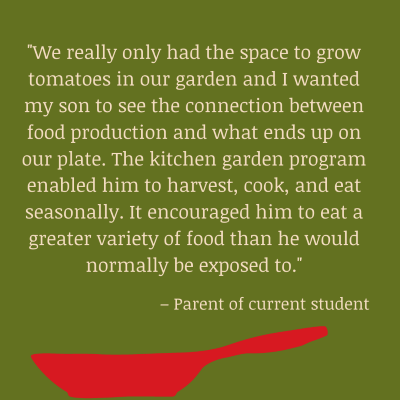
There was a common consensus that the Program shone when schools, parents, and students worked together. Acknowledging the positive impact of the Program on children’s wellbeing and their education is the first step. The responses from parents and current participants confirmed that the skills learnt, and the fun had when working in the garden or learning how to cook in the kitchen could not be understated. Responses from current participants were overwhelming positive about their time with program, and they, along with over 90% of all respondents, told us they thought the Kitchen Garden Program should be in every school – something we wholeheartedly strive for!
Thanks to everyone who participated in the survey – the Foundation team has pored over the results and while we’ve enjoyed all the positive feedback, we’re actively looking at your constructive suggestions and ideas to make the program ever bolder and stronger.
Haven’t had your say? Complete the Community Survey here.
< Back to Latest News
